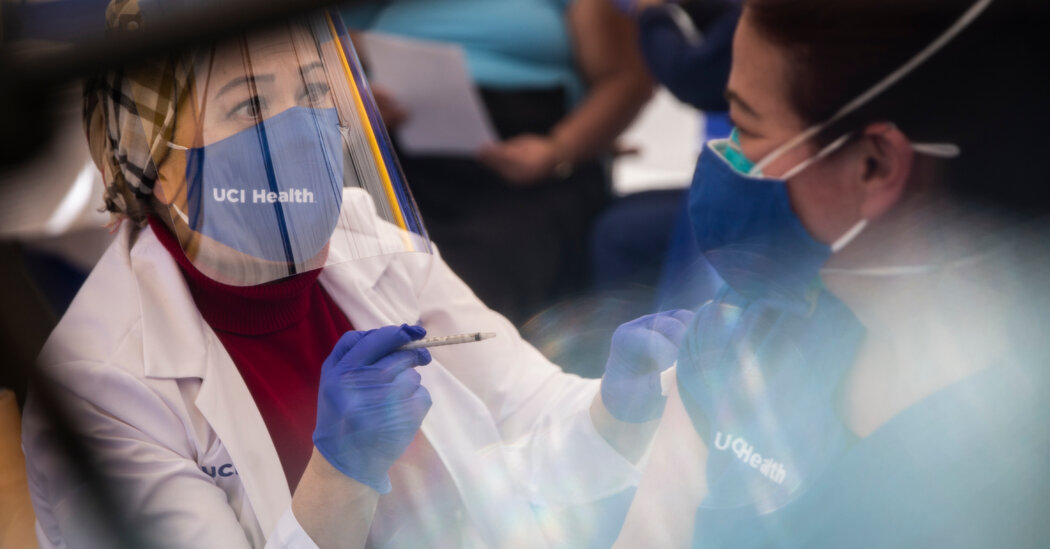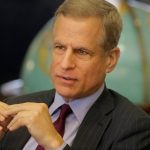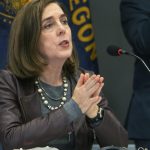
New federal safety regulations that call for businesses with more than 100 workers to require vaccinations against the coronavirus will affirm mandates already in place at many companies and give cover to employers that had yet to decide.
The proposed rules, which President Biden announced on Thursday, will require workers to be inoculated or face weekly testing and will mandate that the businesses offer employees paid time off to get vaccinated. They are the government’s biggest push yet to draw employers into a campaign to vaccinate the country.
Some 80 million workers will be affected. The requirements will be imposed by the Department of Labor and its Occupational Safety and Health Administration, which is drafting an emergency temporary standard to carry out the mandate, according to the White House.
“Some of the biggest companies are already requiring this — United Airlines, Disney, Tyson Foods and even Fox News,” Mr. Biden said during a speech Thursday.
The move, though, is sure to face political pushback and litigation. And it faces considerable challenges, like establishing a way to gather and store the vaccination information, as well as a process for exemptions. The president did not specify penalties for flouting the requirements.
Lawyers said Thursday that it was not immediately clear whether the rule would apply to all employees or only those who work in company offices or facilities.
The Biden administration also intends to require vaccination for federal workers and contractors, as well as for 17 million health care workers in hospitals and other institutions that receive Medicare and Medicaid funding.
Mr. Biden pleaded for more businesses to help the effort to increase vaccinations. “To those of you running large entertainment venues — from sports arenas, to concert venues, to movie theaters — please require folks to get vaccinated or show a negative test as a condition of entry,” he said.
OSHA oversees workplace safety, which the agency is likely to contend extends to vaccine mandates. The agency has issued other guidelines for pandemic precautions, such as a rule in June requiring health care employers to provide protective equipment, provide adequate ventilation and ensure social distancing, among other measures.
“I think that the Department of Labor probably is in good stead to be able to justify its mandate for health and safety reasons for the workers,” said Steve Bell, a partner at the law firm Dorsey & Whitney who specializes in labor and employment.
“They’ve got a broad pretty solid basis for saying: ‘We’re here to protect the workers, and this is part of our purview, and we think that this is something that will protect employees,’” he said.
OSHA has the authority to quickly issue a rule, known as an emergency temporary standard, if it can show that workers are exposed to a grave danger and that the rule is necessary to address that danger. The rule must also be feasible for employers to enforce.
Such a standard would pre-empt existing rules by state governments, except in states that have their own OSHA-approved workplace agencies — about half the states in the country. States with their own programs have 30 days to adopt a standard that is at least as effective, and that must cover state and local government employees, such as teachers. Federal OSHA rules do not cover state and local government employees.
The regulation is expected to be challenged in court by employers and perhaps even some states. But the legal basis for a state challenge is likely to be weakest in states that are directly within OSHA’s jurisdiction. Among them are some of the states that have been hardest hit by Covid-19 recently and where politicians have been resistant to mandates — such as Texas and Florida.
The U.S. Chamber of Commerce, the business lobby, said in a statement that it “will work to ensure that employers have the resources, guidance and flexibility necessary to ensure the safety of their employees and customers and comply with public health requirements.” Another major business advocacy group, the Business Roundtable, said it “welcomes” the Biden administration actions, including the requirement that companies offer paid time off for workers to get vaccinated.
The Culinary Workers Union, which represents 57,000 workers in Nevada, said “stricter” vaccine mandates were “the only way we see a full recovery possible.”
But some unions have been wary of mandates, with members worrying about potential health side effects or bristling at the idea of an employer’s interfering in what they regard as a personal health decision.
Understand Vaccine and Mask Mandates in the U.S.
-
- Vaccine rules. On Aug. 23, the Food and Drug Administration granted full approval to Pfizer-BioNTech’s coronavirus vaccine for people 16 and up, paving the way for an increase in mandates in both the public and private sectors. Private companies have been increasingly mandating vaccines for employees. Such mandates are legally allowed and have been upheld in court challenges.
- Mask rules. The Centers for Disease Control and Prevention in July recommended that all Americans, regardless of vaccination status, wear masks in indoor public places within areas experiencing outbreaks, a reversal of the guidance it offered in May. See where the C.D.C. guidance would apply, and where states have instituted their own mask policies. The battle over masks has become contentious in some states, with some local leaders defying state bans.
- College and universities. More than 400 colleges and universities are requiring students to be vaccinated against Covid-19. Almost all are in states that voted for President Biden.
- Schools. Both California and New York City have introduced vaccine mandates for education staff. A survey released in August found that many American parents of school-age children are opposed to mandated vaccines for students, but were more supportive of mask mandates for students, teachers and staff members who do not have their shots.
- Hospitals and medical centers. Many hospitals and major health systems are requiring employees to get a Covid-19 vaccine, citing rising caseloads fueled by the Delta variant and stubbornly low vaccination rates in their communities, even within their work force.
- New York City. Proof of vaccination is required of workers and customers for indoor dining, gyms, performances and other indoor situations, although enforcement does not begin until Sept. 13. Teachers and other education workers in the city’s vast school system will need to have at least one vaccine dose by Sept. 27, without the option of weekly testing. City hospital workers must also get a vaccine or be subjected to weekly testing. Similar rules are in place for New York State employees.
- At the federal level. The Pentagon announced that it would seek to make coronavirus vaccinations mandatory for the country’s 1.3 million active-duty troops “no later” than the middle of September. President Biden announced that all civilian federal employees would have to be vaccinated against the coronavirus or submit to regular testing, social distancing, mask requirements and restrictions on most travel.
On Aug. 23, the Food and Drug Administration paved the way for broader mandates when it gave full approval to the Pfizer-BioNTech vaccine.
Employers as various as CVS Health, Goldman Sachs and Chevron have put in place some form of requirement. Companies have been eager to get their workers back into the office and return to a degree of normalcy. And others, like AstraZeneca and JPMorgan Chase, are already requiring vaccination or else weekly testing.
Still, many mandates are not comprehensive. Companies like Walmart and Citigroup have requirements for their corporate employees but not for frontline workers in stores or at branches. Many companies are dealing with labor shortages and varying levels of vaccine hesitancy among workers.
“It levels the playing field,” said Ian Schaefer, a partner at the law firm Loeb & Loeb who specializes in labor issues and has been advising companies on their Covid policies. “Particularly in service industries or industries where they may have been represented by minority populations or lower-wage earners who are disproportionately likely not to be vaccinated — those employers were reluctant to push out a vaccine mandate because they thought they’d lose talent.”
“If they rolled out that mandate and people in their work stream weren’t getting vaccinated and walking across the street elsewhere, they’d be in a bind,” he said.
Mr. Biden had already raised the pressure on private employers to help with vaccination efforts. In August, the White House met with executives of companies that had mandated vaccination, including Scott Kirby of United Airlines, to discuss how they could encourage fellow business leaders to do the same.
Joseph Allen, an associate professor at the Harvard T.H. Chan School of Public Health who advises companies on Covid strategies, said the wide-ranging rule announced on Thursday was “a clear signal” from the federal government that it stood behind mandates.
“I suspect the dominoes will keep dropping,” he said. “It’s also necessary and needed. The voluntary approach has hit its limit.”
Katie Rogers and Noam Scheiber contributed reporting.







